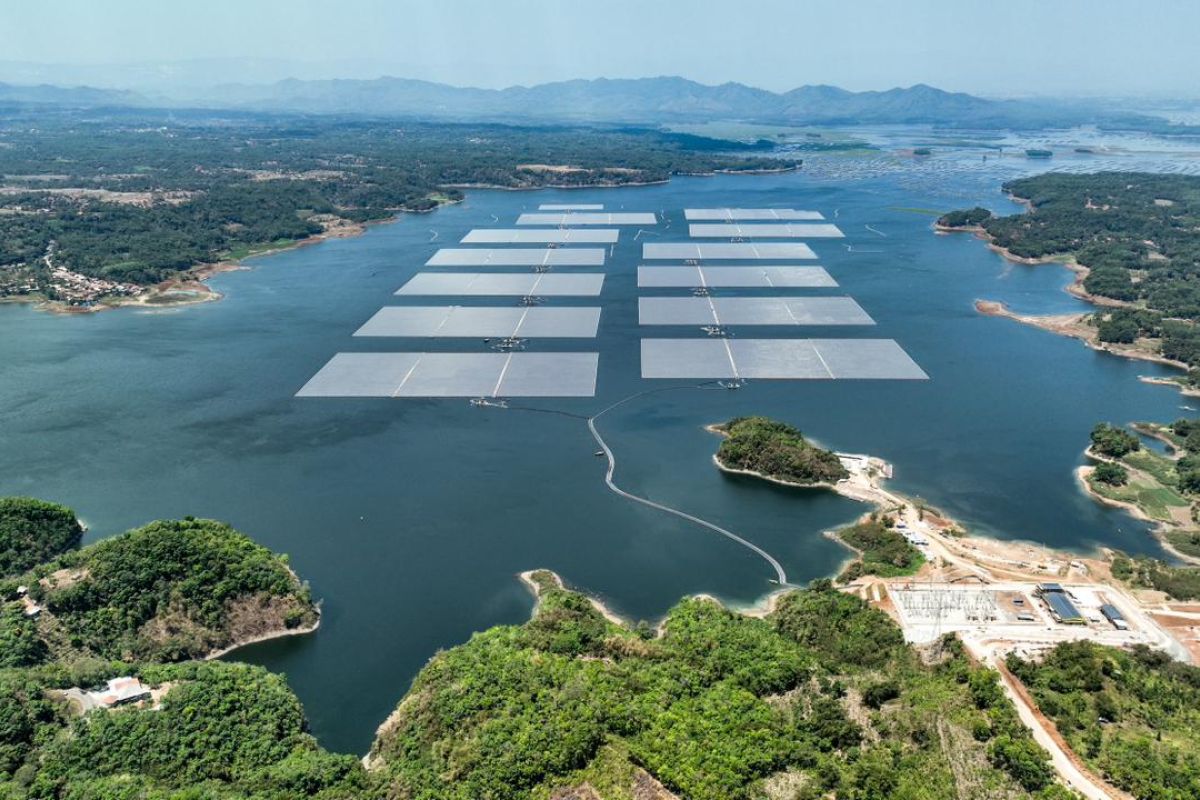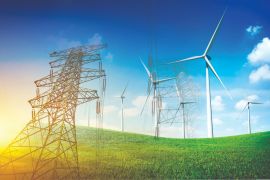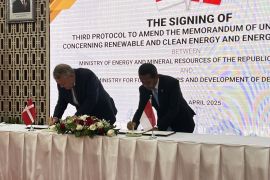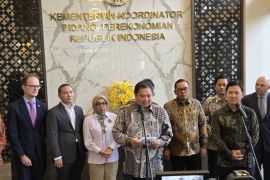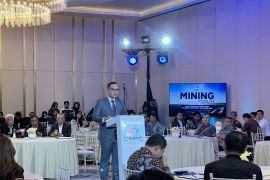The Indonesian Government has made the commitment to reduce greenhouse gas emissions in the energy sector by 358 million tons of CO2 or 12.5 percent with its own efforts, or 446 million tons of CO2 or 15.5 percent with international support by 2030, as per the Nationally Determined Contribution (NDC) document.
In addition, the government targets to achieve net zero emission (NZE) by 2060 or even sooner.
The government encourages the use of renewable energy to achieve those targets. Indonesia itself has a huge energy potential for utilizing renewable energy sources, such as solar energy, hydropower, bioenergy, wind energy, geothermal energy, and marine energy.
At the recent 28th meeting of the Conference of the Parties to the UNFCCC (COP28) in Dubai, the United Arab Emirates (UAE), President Joko Widodo (Jokowi) also emphasized Indonesia's commitment to reaching those targets.
However, Indonesia needs an investment of more than US$1 trillion to realize NZE by 2060.
To this end, Indonesia is seeking collaboration with bilateral partners, private investment, support from philanthropic institutions, and support from friendly countries.
The participation of state-owned enterprises (SOEs) in the energy sector in COP28, such as state-run oil and gas company PT Pertamina and state-run electricity company PT PLN, through the signing of memoranda of understanding (MoU) with several global companies, is expected to support the achievement of NZE.
With the situation of deteriorating air quality in Jakarta that occurred around August 2023, energy transition efforts are deemed relevant.
At that time, several parties pushed the government to develop infrastructure for transportation that uses renewable energy, such as electric vehicles (EVs), and the use of biodiesel and biofuel for trains, buses, and other public transportation.
Energy issue
The energy issue is under the spotlight in the visions, missions, and work programs of presidential and vice presidential candidates for the 2024 General Elections, scheduled for February 14.
There are three pairs of presidential and vice presidential candidates: Anies Baswedan-Muhaimin Iskandar, Prabowo Subianto-Gibran Rakabuming Raka, and Ganjar Pranowo-Mahfud MD.
The Baswedan-Iskandar pair is raising the energy security topic, among others, by implementing the "Indonesia Towards New and Renewable Energy (NRE)" program realized through energy diversification, including bioenergy, geothermal, power generated by falling water, wind, hydrogen, and solar power with support from the government in terms of financing and potential mapping as well as maximizing technology transfer.
It also includes opening opportunities for people and communities to produce NRE and market it to PT PLN to encourage the growth of NRE.
The pair also aims to encourage the use of public transportation through education, improving facilities and infrastructure, and increasing services and economical ticket prices, followed by the shift towards electric public transportation.
Meanwhile, the Subianto-Raka pair is raising the topic of energy self-sufficiency, which is realized through several programs, such as reducing dependence on fossil energy and making Indonesia the world's green energy superpower in the field of renewables and bioenergy.
One of the programs also includes revising regulations that hinder efforts to increase new investment in the NRE sector.
Furthermore, the pair aims to expand the conversion of motor vehicles to gas and electricity as well as increase the share of NRE in PLN's electricity mix.
Meanwhile, the Pranowo-Mahfud pair has included the energy issue through the green economy program.
Regarding energy transition, the pair encourages the gradual use of NRE, with a potential of around 3,700 gigawatts, for domestic energy needs, so that the share of NRE in the energy mix could reach 25-30 percent by 2029.
Furthermore, they also include the energy self-sufficient village program. Under the program, villages are expected to utilize local NRE-based energy sources to meet their energy needs and become part of the efforts to green Indonesia's economy.
Concrete action
The strong awareness and ambition of Indonesian leaders will be reflected by the presence of breakthroughs that can accelerate the development of renewable energy in Indonesia.
The Indonesia Clean Energy Forum (ICEF) assessed that the presidential and vice presidential candidate pairs need to concretely and strategically elaborate ambitious climate mitigation actions and massive renewable energy development, so that Indonesia can lead the gigawatt order of renewable energy in the ASEAN.
Chairman of ICEF Bambang Brodjonegoro stated that the ICEF actively discusses the energy issue and produces innovative ideas to encourage Indonesia's energy transition.
At separate meetings with the candidates, those ideas have been conveyed to each presidential and vice presidential pair.
The organization also invited all candidates to actively engage with stakeholders, including civil society organizations, businesses, and academics, in designing and developing effective and inclusive clean energy programs.
Executive Director of ICEF and Institute for Essential Services Reform (IESR) Fabby Tumiwa stated that the leadership in Indonesia for the next five years will determine the country's energy transition and economic growth.
All presidential and vice presidential candidates are expected to take into consideration the conveyed input in developing energy sector strategies and programs, so that whoever is elected can ensure the continuity of energy transition.
The issue of energy is one of the themes in the fourth presidential-vice presidential debate, scheduled for January 21, 2024.
Indeed, the public is expecting the candidates to provide concrete explanations on the programs that have been included in their visions and missions, with the aim of realizing Indonesia's clean energy goals.
Related news: IKN solar power plant to become operational in February 2024
Related news: Pertamina reaffirms its commitment to net zero emissions by 2060
Editor: Rahmad Nasution
Copyright © ANTARA 2023
